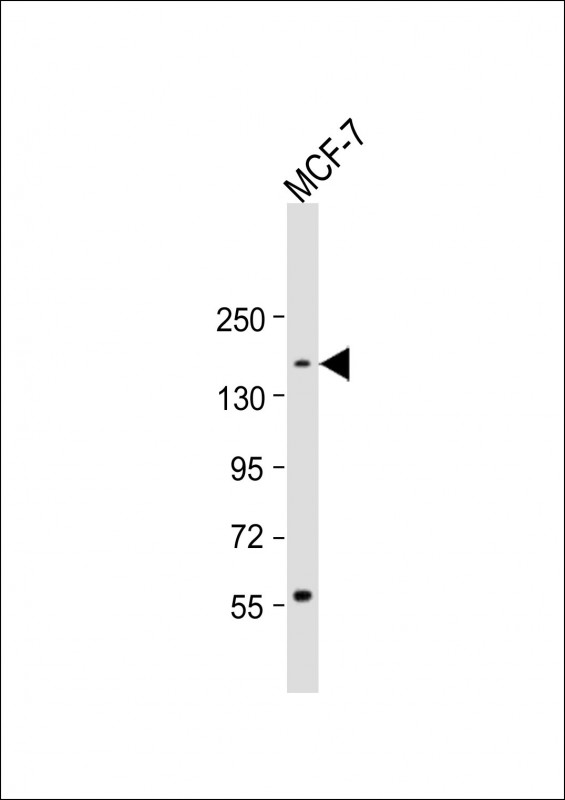ADNP Antibody (C-term)
Affinity Purified Rabbit Polyclonal Antibody (Pab)
- 产品详情
- 实验流程
- 背景知识
Application
| WB, E |
|---|---|
| Primary Accession | Q9H2P0 |
| Other Accession | Q9Z103, NP_852107.1 |
| Reactivity | Human |
| Host | Rabbit |
| Clonality | Polyclonal |
| Isotype | Rabbit IgG |
| Calculated MW | 123563 Da |
| Antigen Region | 831-860 aa |
| Gene ID | 23394 |
|---|---|
| Other Names | Activity-dependent neuroprotector homeobox protein, Activity-dependent neuroprotective protein, ADNP, ADNP1, KIAA0784 |
| Target/Specificity | This ADNP antibody is generated from rabbits immunized with a KLH conjugated synthetic peptide between 831-860 amino acids from the C-terminal region of human ADNP. |
| Dilution | WB~~1:1000 E~~Use at an assay dependent concentration. |
| Format | Purified polyclonal antibody supplied in PBS with 0.09% (W/V) sodium azide. This antibody is purified through a protein A column, followed by peptide affinity purification. |
| Storage | Maintain refrigerated at 2-8°C for up to 2 weeks. For long term storage store at -20°C in small aliquots to prevent freeze-thaw cycles. |
| Precautions | ADNP Antibody (C-term) is for research use only and not for use in diagnostic or therapeutic procedures. |
| Name | ADNP |
|---|---|
| Synonyms | ADNP1, KIAA0784 |
| Function | May be involved in transcriptional regulation. May mediate some of the neuroprotective peptide VIP-associated effects involving normal growth and cancer proliferation. Positively modulates WNT-beta- catenin/CTNN1B signaling, acting by regulating phosphorylation of, and thereby stabilizing, CTNNB1. May be required for neural induction and neuronal differentiation. May be involved in erythroid differentiation (By similarity). |
| Cellular Location | Nucleus {ECO:0000255|PROSITE-ProRule:PRU00108}. Chromosome {ECO:0000250|UniProtKB:Q9Z103} |
| Tissue Location | Widely expressed. Strong expression in heart, skeletal muscle, kidney and placenta. In brain, expression is stronger in the cerebellum and cortex regions. No expression detected in the colon. Strong increase of expression in colon and breast cancer tissues |
For Research Use Only. Not For Use In Diagnostic Procedures.
Provided below are standard protocols that you may find useful for product applications.
BACKGROUND
Vasoactive intestinal peptide is a neuroprotective factor that has a stimulatory effect on the growth of some tumor cells and an inhibitory effect on others. This gene encodes a protein that is upregulated by vasoactive intestinal peptide and may be involved in its stimulatory effect on certain tumor cells. The encoded protein contains one homeobox and nine zinc finger domains, suggesting that it functions as a transcription factor. This gene is also upregulated in normal proliferative tissues. Finally, the encoded protein may increase the viability of certain cell types through modulation of p53 activity. Alternatively spliced transcript variants encoding the same protein have been described. [provided by RefSeq].
REFERENCES
Braitch, M., et al. Neuroimmunomodulation 17(2):120-125(2010)
Mandel, S., et al. J. Biol. Chem. 282(47):34448-34456(2007)
Wu, C., et al. Proteomics 7(11):1775-1785(2007)
Matsuoka, S., et al. Science 316(5828):1160-1166(2007)
Kankova, K., et al. Diabetologia 50(5):990-999(2007)
终于等到您。ABCEPTA(百远生物)抗体产品。
点击下方“我要评价 ”按钮提交您的反馈信息,您的反馈和评价是我们最宝贵的财富之一,
我们将在1-3个工作日内处理您的反馈信息。
如有疑问,联系:0512-88856768 tech-china@abcepta.com.























 癌症的基本特征包括细胞增殖、血管生成、迁移、凋亡逃避机制和细胞永生等。找到癌症发生过程中这些通路的关键标记物和对应的抗体用于检测至关重要。
癌症的基本特征包括细胞增殖、血管生成、迁移、凋亡逃避机制和细胞永生等。找到癌症发生过程中这些通路的关键标记物和对应的抗体用于检测至关重要。 为您推荐一个泛素化位点预测神器——泛素化分析工具,可以为您的蛋白的泛素化位点作出预测和评分。
为您推荐一个泛素化位点预测神器——泛素化分析工具,可以为您的蛋白的泛素化位点作出预测和评分。 细胞自噬受体图形绘图工具为你的蛋白的细胞受体结合位点作出预测和评分,识别结合到自噬通路中的蛋白是非常重要的,便于让我们理解自噬在正常生理、病理过程中的作用,如发育、细胞分化、神经退化性疾病、压力条件下、感染和癌症。
细胞自噬受体图形绘图工具为你的蛋白的细胞受体结合位点作出预测和评分,识别结合到自噬通路中的蛋白是非常重要的,便于让我们理解自噬在正常生理、病理过程中的作用,如发育、细胞分化、神经退化性疾病、压力条件下、感染和癌症。






